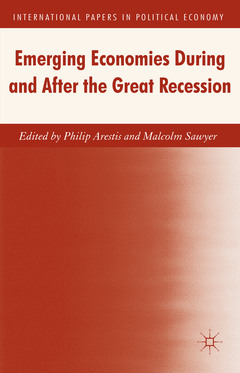Description
Emerging Economies During and After the Great Recession, 1st ed. 2016
International Papers in Political Economy Series
Language: English
Subjects for Emerging Economies During and After the Great Recession:
Keywords
money; finance; banking; recession; crisis; political economy; China; Eastern Europe; economic policy; growth; transition
Publication date: 01-2016
318 p. · 14x21.6 cm · Hardback
318 p. · 14x21.6 cm · Hardback
Description
/li>Contents
/li>Biography
/li>
The International Papers in Political Economy (IPPE) series explores the latest developments in political economy. This twelfth volume presents a collection of eight papers, analysing the emergence and economic problems of the emerging economies during and after the international financial crisis of 2007?8 and the subsequent Great Recession.
The contributions range from an analysis of the international financial crisis of 2007?8 in general terms to an analysis of the same but concentrating on the emerging economies, before turning to groups of economies, Arab, African and Eastern European countries, and two relevant but individual countries, namely China and Turkey.
This book offers students, scholars, researchers and policy-makers detailed analysis and informed commentary on the origins of the international financial crisis of 2007?8 and the great recession by focusing on its effect on emerging countries.
The contributions range from an analysis of the international financial crisis of 2007?8 in general terms to an analysis of the same but concentrating on the emerging economies, before turning to groups of economies, Arab, African and Eastern European countries, and two relevant but individual countries, namely China and Turkey.
This book offers students, scholars, researchers and policy-makers detailed analysis and informed commentary on the origins of the international financial crisis of 2007?8 and the great recession by focusing on its effect on emerging countries.
Table of Contents
List of Figures
List of Tables
Preface
Notes on Contributors
1. Main and Contributory Causes of the Recent Financial Crisis and Economic Policy Implications; Philip Arestis
2. The Emerging Market Economies and the Great Recession; Ahmad Seyf
3. Africa and the Great Recession: The Dynamics of Growth Sustainability; Howard Stein
4. Arab Countries in Transition in the Aftermath of the Great Recession: The Policy Options; Yiannis Kitromilides
5. The Impact of the Great Recession and Policy Responses in Latin America: Was This Time Different?; Luiz Fernando de Paula and Fernando Ferrari Filho
6. An Eastern European Perspective on the Recent Financial Crisis and an Examination of Poland's Exceptionalism; Nigel F. B. Allington and John S. L. McCombie
7. China Confronts the Great Recession: 'Rebalancing' Neoliberalism, or Else?; Dic Lo
8. The Political Economy of Inequality and Boom-Bust Cycles in Turkey: Before and After the Great Recession; ?zlem Onaran and Cem Oyvat
Index
?
List of Figures
List of Tables
Preface
Notes on Contributors
1. Main and Contributory Causes of the Recent Financial Crisis and Economic Policy Implications; Philip Arestis
2. The Emerging Market Economies and the Great Recession; Ahmad Seyf
3. Africa and the Great Recession: The Dynamics of Growth Sustainability; Howard Stein
4. Arab Countries in Transition in the Aftermath of the Great Recession: The Policy Options; Yiannis Kitromilides
5. The Impact of the Great Recession and Policy Responses in Latin America: Was This Time Different?; Luiz Fernando de Paula and Fernando Ferrari Filho
6. An Eastern European Perspective on the Recent Financial Crisis and an Examination of Poland's Exceptionalism; Nigel F. B. Allington and John S. L. McCombie
7. China Confronts the Great Recession: 'Rebalancing' Neoliberalism, or Else?; Dic Lo
8. The Political Economy of Inequality and Boom-Bust Cycles in Turkey: Before and After the Great Recession; ?zlem Onaran and Cem Oyvat
Index
?
Philip Arestis is Professor and Director of Research, Cambridge Centre for Economics and Public Policy, Department of Land Economy, University of Cambridge, UK, and Professor of Economics at the Department of Applied Economics, University of the Basque Country, Spain. He is also Distinguished Adjunct Professor of Economics, University of Utah, USA; Research Associate, Levy Economics Institute, New York, USA; Visiting Professor, University of Leeds, UK; and Professorial Research Associate, School of Oriental and African Studies (SOAS), University of London, UK. He also served (2005–13) as Chief Academic (External) Adviser to the UK Government Economic Service (GES) on Professional Development in Economics. He is holder of the 'Queen Victoria Eugenia' award of the British Hispanic Chair of Doctoral Studies, and was awarded 'homage' by the Brazilian Keynesian Association (AKB) for his contribution to the spread of Keynesianism in Brazil. He is also holder of the Fellow of the Academy of Social Sciences award of the Academy of Social Sciences for contributions to Social Sciences. He has published as sole author or editor, as well as co-author and co-editor, a number of books and papers in academic journals.
Malcolm Sawyer is Emeritus Professor of Economics , Leeds University Business School, University of Leeds, UK. He is the principal investigator for the five year 15-partner project Financialisation, Economy, Society and Sustainable Development (www.fessud.eu) fundedby the European Commission Framework Programme 7 (contract number: 266800). He is Managing Editor of the International Review of Applied Economics, on the editorial board of a range of journals and editor of the series New Directions in Modern Economics. He has published widely in the areas of post-Keynesian and Kaleckian economics, financialisation, fiscal policy, money, industrial economics and on UK and European economies.
Malcolm Sawyer is Emeritus Professor of Economics , Leeds University Business School, University of Leeds, UK. He is the principal investigator for the five year 15-partner project Financialisation, Economy, Society and Sustainable Development (www.fessud.eu) fundedby the European Commission Framework Programme 7 (contract number: 266800). He is Managing Editor of the International Review of Applied Economics, on the editorial board of a range of journals and editor of the series New Directions in Modern Economics. He has published widely in the areas of post-Keynesian and Kaleckian economics, financialisation, fiscal policy, money, industrial economics and on UK and European economies.
© 2024 LAVOISIER S.A.S.

